Are you struggling with low visitor numbers despite having a visually appealing website and lots of content?
Perhaps you are considering paid ads to improve your online presence and generate leads at this point.
Before you give up on organic traffic, continue reading this article, where I’m going to walk you through an intensive guide and an in-depth exploration of organic traffic definition and some tips on how to generate more organic traffic to your website.
What Is Organic Traffic?
Organic traffic is the number of visits to your website that originated from unpaid sources. In other words, from the results pages of the different search engines without the use of ads.
What are the benefits of Organic Traffic?
Organic traffic is essential for scaling your business and it has many benefits.
Here are some reasons why organic traffic is important:
1- Cost-effectiveness:
Some people refer to organic traffic as free traffic. While this is not totally accurate, because you will still need to invest some money and effort in writing for example, and in other aspects that we will later discuss in detail, it definitely still is a very cost-effective marketing channel compared to ads.
Also, organic traffic has higher conversion rates which means better profit margins.
2- Longtivity and Evergreeness:
Organic traffic is a sustainable method of generating leads in the long run. It has no expiration date compared to paid ad campaigns. Your optimized content can keep attracting visitors monthly for years after that content creation.
3- Scalability:
Scaling on paid digital marketing channels can’t happen without investing larger amounts of money. However, organic traffic sources can be improved and scaled through time with little effort to update and tweak them regularly.
4- Trust and authority:
Searchers tend to trust top-ranking results that have no sponsored ad sign next to them. The concept of paying for those results to show on top gives the audience the vibe of these pages being selling-focused.
5- Traffic quality:
Organic traffic brings in highly qualified leads who have a great interest in your industry. They are also more qualified to go through the buying journey starting from having the interest and searching for solutions or products.
How to Increase Organic Traffic?
Now you have a good understanding of the definition of organic traffic and the benefits of organic traffic. Next, we will dive into some strategies to increase organic traffic.
Top 7 Key SEO Strategies to Increase Organic Traffic
1- Develop a Keyword Strategy
2- Create a high-quality Content
3- Follow The On-Page Optimization Techniques
4- Build Off-Page Strategies for Organic Traffic
5- Update and Optimize Local Listings
6- Work on Technical SEO
7- Analyze and Refine Performance
Develop a Keyword Strategy
Your first step in driving more organic traffic to your website is to come up with a strong keyword strategy. Keywords determine your position in the SERPs.
Search engines function mainly based on the words users search with and bring up search results that match those keywords and are more likely to fit their needs.
A keyword strategy is all about understanding these specific words and phrases that your target audience is likely to search with looking for information and services related to your industry.
A strong keyword strategy includes several steps:
1- Perform Keyword Research
Start with keyword research to find out the words and sentences that you can target in your content and that can help you rank on top of SERPs.
Use the Keywords Everywhere SEO tool in your keyword research to help you:
Understand some important SEO metrics as you start typing in Google such as search volume, competition, CPC, and trending data.
Analyze the Keyword SEO Difficulty by going through the Keywords Everywhere widget and the different keyword difficulty metrics.
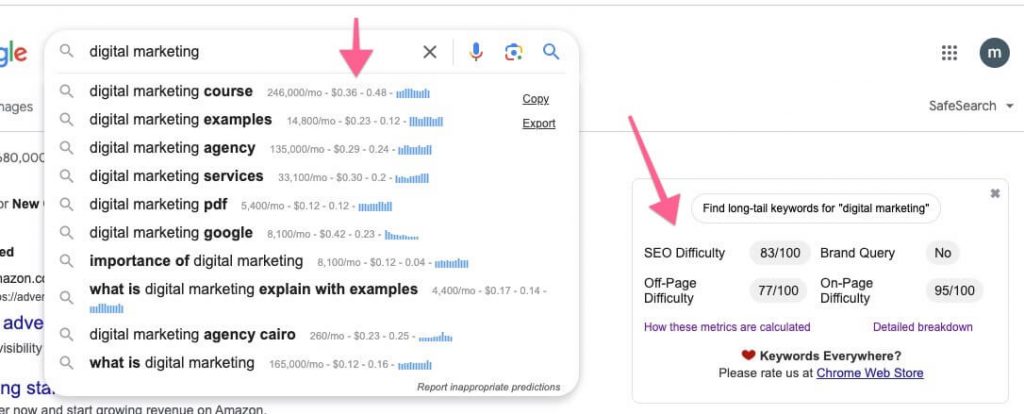
Find more keyword ideas by checking out the other Keywords Everywhere widgets such as Related Keywords and People Also Search For.
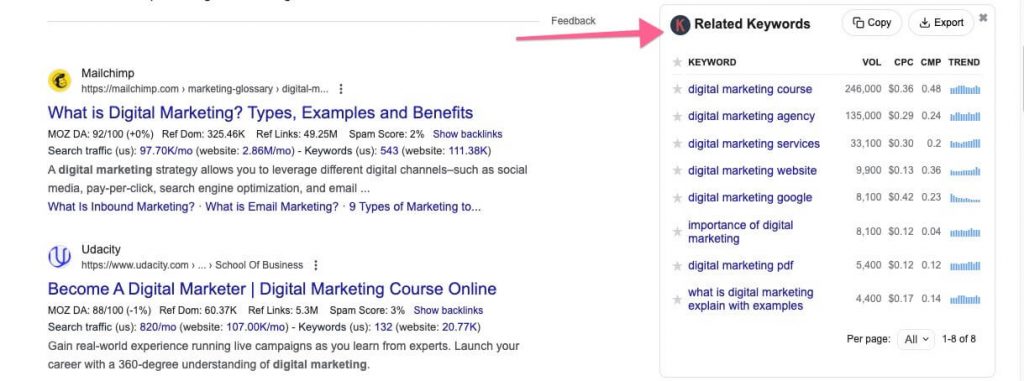
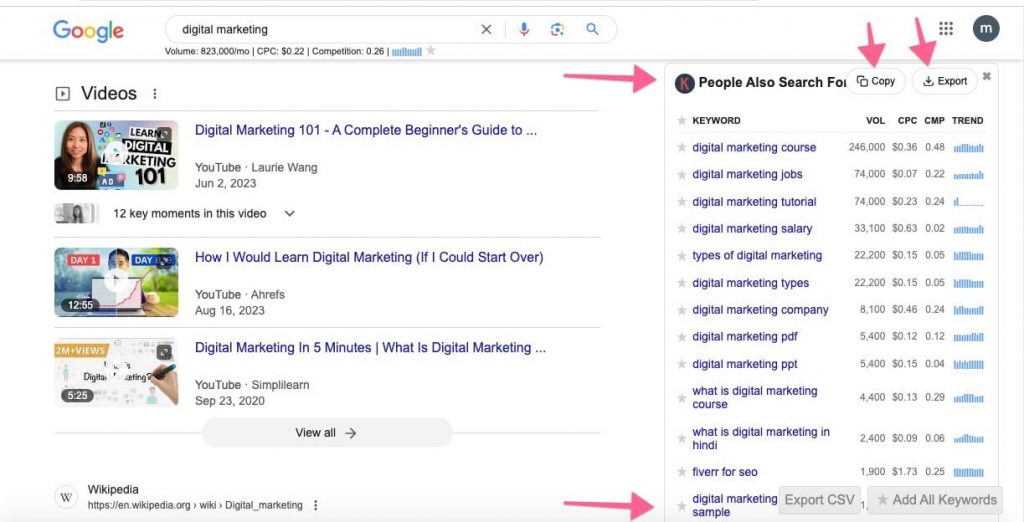
Identify long-tail keywords which have less competition rate and high search volume.
Utilize the “find long-tail keywords” button to be directed to a complete list of long-tail keywords and see their search volume and other metrics to help you choose what to target.
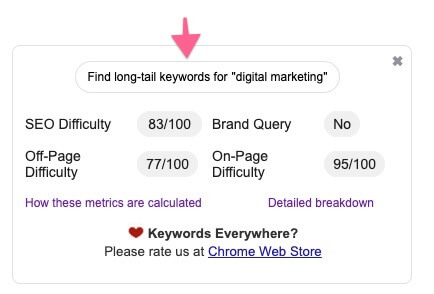
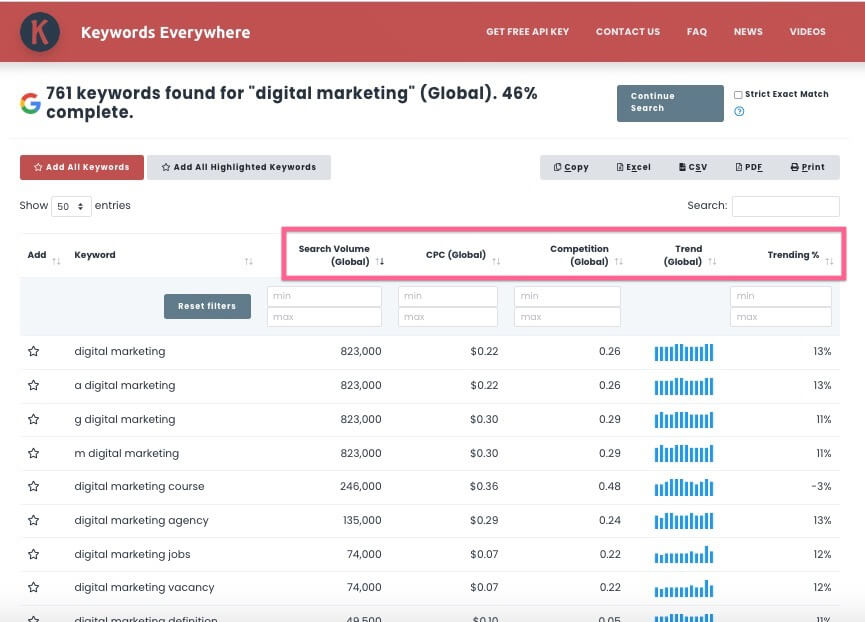
2- Conduct Competitor Research
Analyzing the keywords your competitors use is one easy and very fast tactic for enriching the organic traffic to your website.
Learn more about the organic traffic the top-ranking competitors receive and the keywords they are ranking for directly on the SERP using Keywords Everywhere.
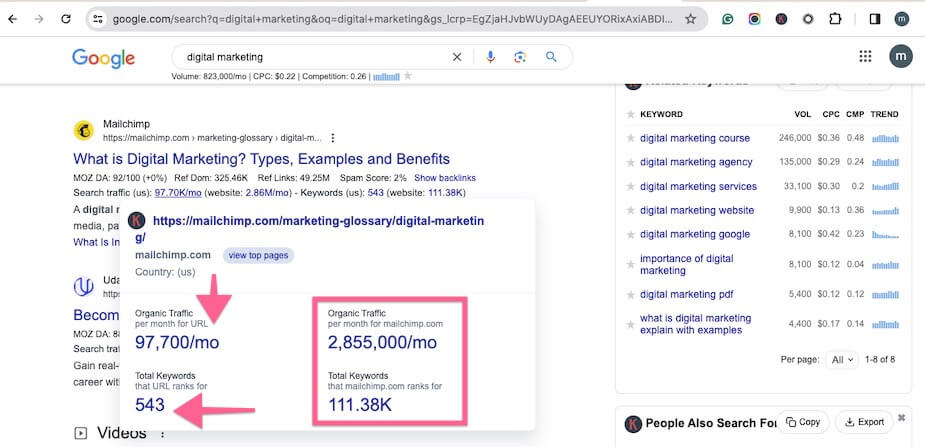
Analyze the entire competitor keywords list by clicking on the number of keywords or by using the Organic Ranking Keywords (URL) options in the Keywords Everywhere extension.
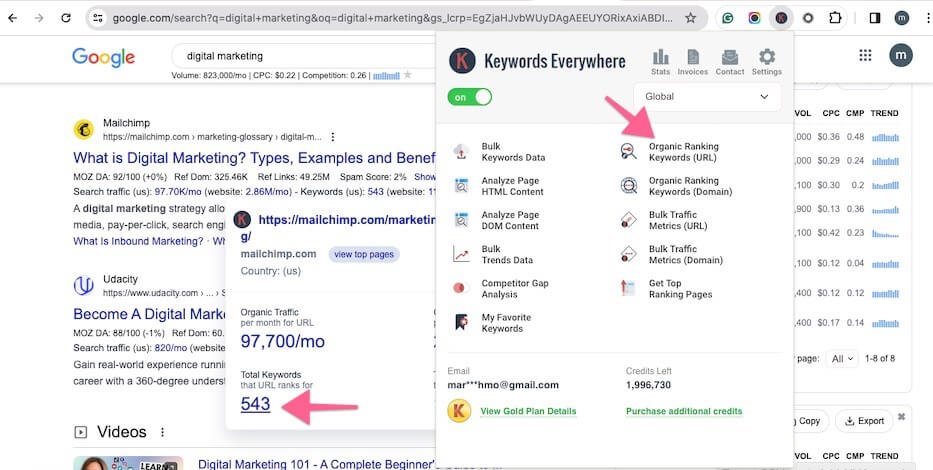
You can also analyze your competitors’ keywords on the domain level to find all the keywords they are ranking for overall and not just for the terms or phrases you are looking at through Keywords Everywhere’s feature Organic Ranking Keywords (Domain).
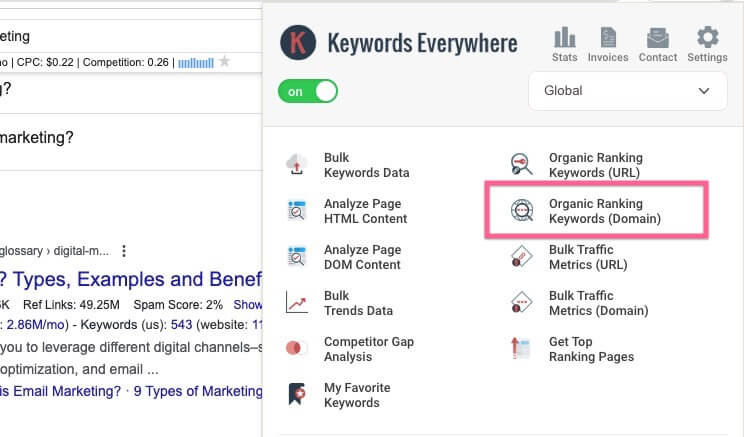
3- Perform Competitor Gap Analysis
Narrow down your competitor keyword research by finding out which specific keywords your competitors are ranking for and you are not to focus on targeting these keywords.
Use the Keywords Everywhere option Competitor Gap Analysis.
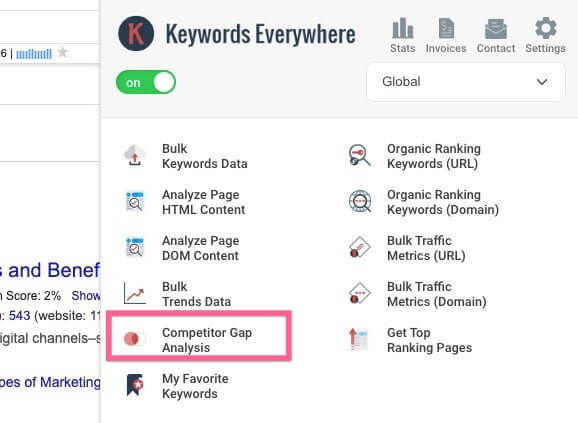
All you need to do is add your website and your competitors’ websites. You can add up to 5 websites at the same time.
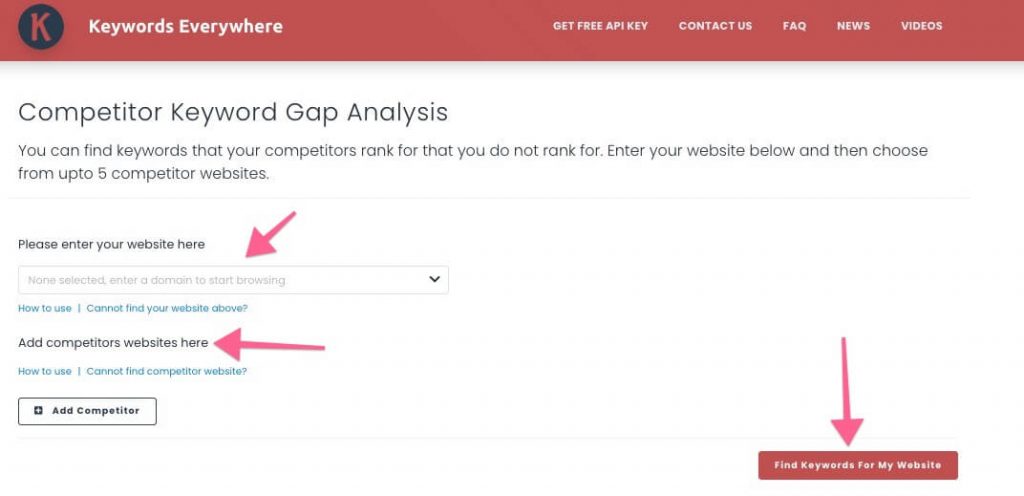
Create a High-quality Content
To rank on the top of the SERPs and generate more organic traffic, you need to create high-quality content with real value to your audience.
By creating high-quality you will also establish authority in your niche, build trust with your audience and earn backlinks.
Work on crafting evergreen content that focuses on timeless topics, fundamental concepts, and subjects that don’t become quickly outdated. Examples are “how-to” guides, tutorials, and informative explanations of industry-related main principles.
Use engaging and eye-catching visuals, infographics, and videos to make your content reader-friendly and more shareable.
Incorporate keywords naturally in your content. Don’t overuse the keywords or force them in your content. This tactic helps search engines better analyze your content and understand its relevance to the users which eventually will lead to more organic traffic to your website.
Follow The On-Page Optimization Techniques
Creating high-quality content and following this with on-page SEO best practices will significantly boost your chances of increasing organic traffic.
Here are the most important On-page optimization techniques:
1- Keyword Optimization
Keyword optimization is crucial. Finding the keywords you want to target is just the beginning; you must ensure their strategic placement across your content, including in your title tag, meta description, H1, H2s, and throughout the body of the content.
2- Optimize Meta Tags
Keep your meta title under 60 characters to guarantee full display in search engine results pages (SERPs). Craft meta descriptions between 150-160 characters, incorporating an appealing call-to-action. Both the meta title and the meta tag should feature your target keywords while maintaining relevance and compelling content.
3- Optimize URL structure
Craft concise yet descriptive URLs that give a clear reference to the page’s content. Avoid lengthy and complex URLs that have unnecessary characters or numbers. Use hyphens to separate words and to maintain simplicity and clarity in the URL structure.
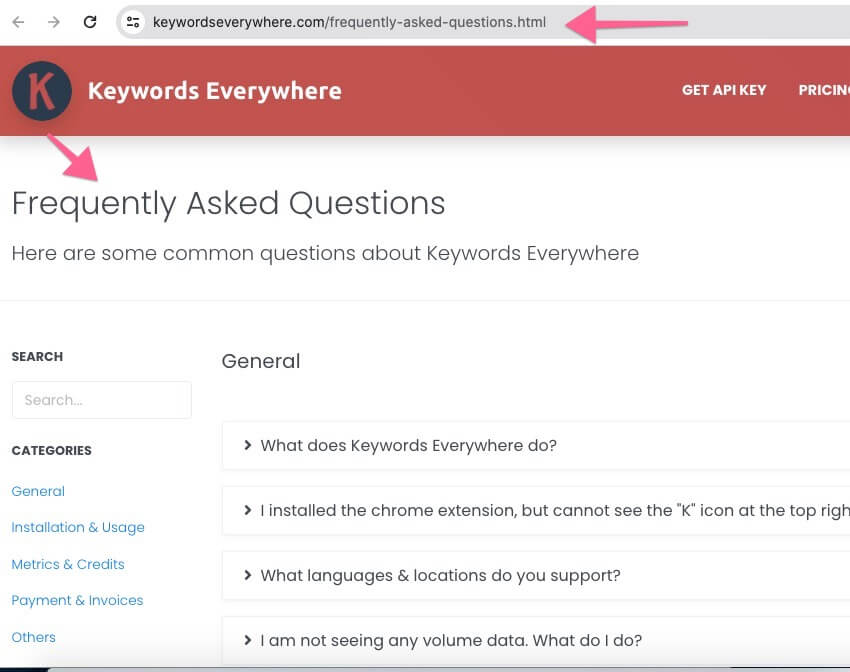
4- Add Alt Text
Alt text is the description of the images you add. It doesn’t show all the time like captions. However, it shows up when the images fail to load. Alt text improves SEO as it helps search engine bots understand image content and better rank your content.
5- Use SEO Minion On-Page SEO analysis tool
SEO Minion offers you a complete on-page SEO analysis to review all the above-discussed items on your website pages.
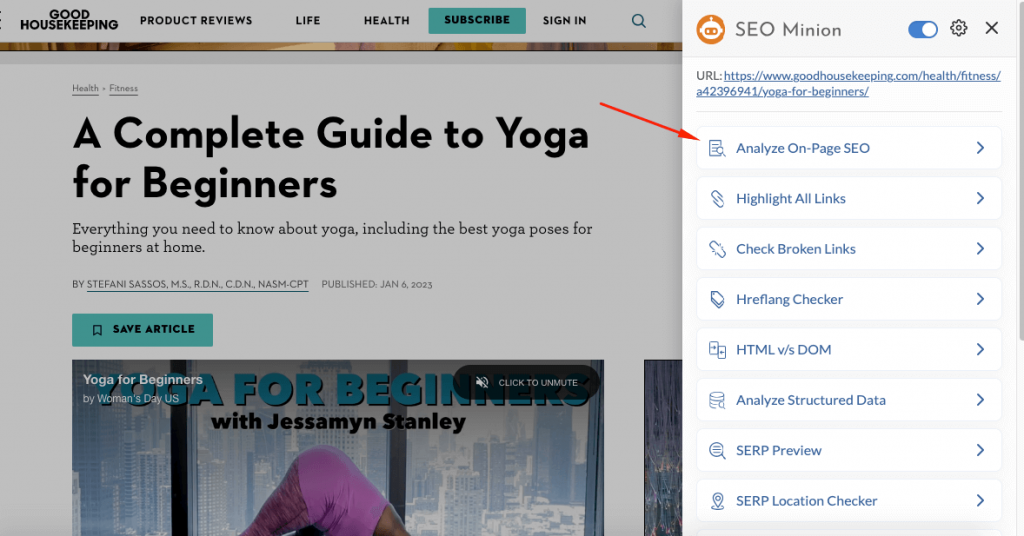
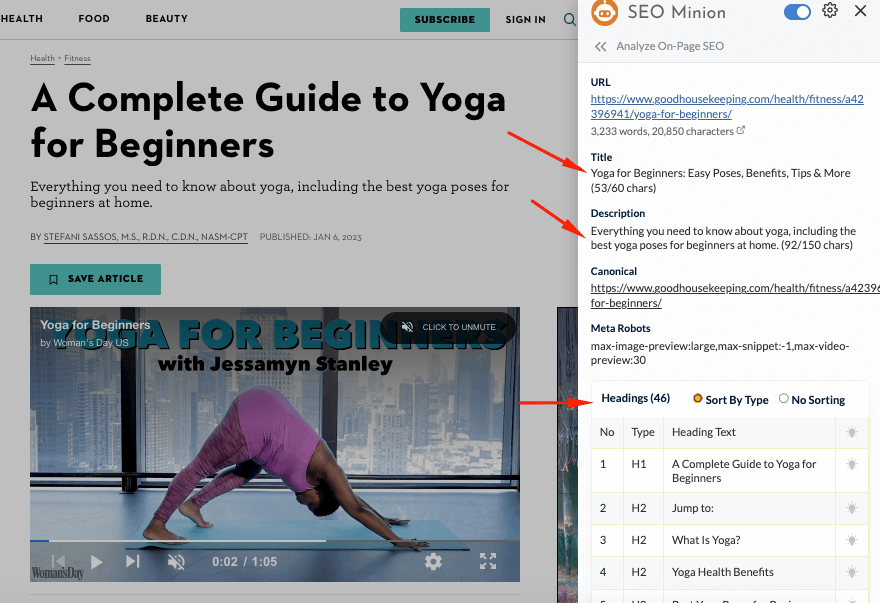
Build Off-Page SEO Strategies for Organic Traffic
Off-page SEO is to drive organic traffic to your website without working on your website itself but on external sources.
Off-page SEO enables search engines and users to identify your website as a trustworthy and authoritative source in your niche/industry.
You can use the Keywords Everywhere widget to understand the off-page difficulty of any keyword or term.
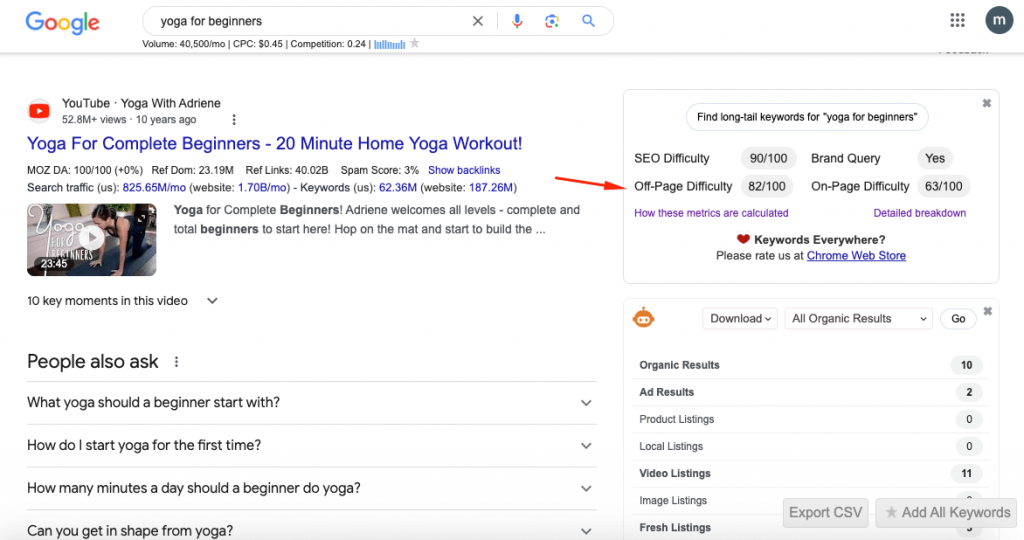
1- Backlink Building
Getting other websites to link back to your website is not easy.
To improve your chances of generating backlinks focus on creating valuable and shareable content.
Set yourself as a trustworthy source and an expert in your industry.
You can check the backlinks your competitors generated through Keywords Everywhere.
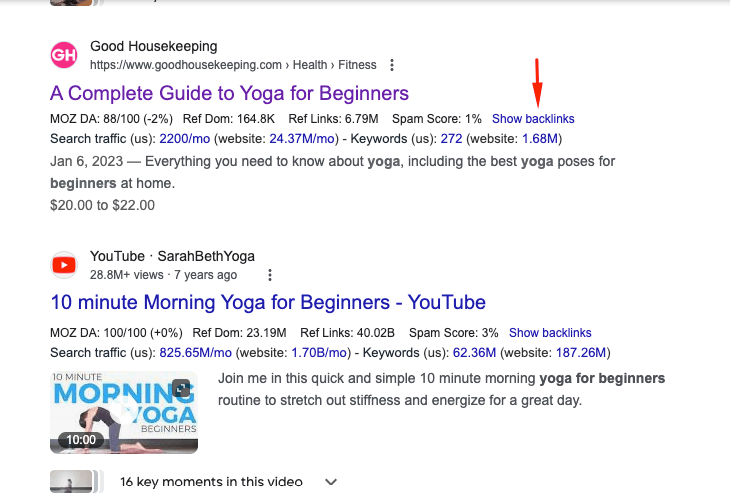
2- Guest Blogging
Guest blogging is a faster proven way to create backlins and increase organic traffic.
Contribute guest posts to respected websites within your niche to expand your reach and introduce your brand to fresh audiences.
Incorporate relevant backlinks to your website within these guest posts to enhance your website’s SEO and organic search performance.
Make sure when engaging in guest blogging, to prioritize delivering valuable and insightful content that resonates with the host website’s audience.
Adhere to the website guidelines to boost the likelihood of acceptance of your post and of driving organic traffic to your site.
3- Leveraging Social Media Platforms
While social media doesn’t directly influence Google rankings, it’s an excellent tool for increasing visibility and directing more visits to your website.
Even without immediate traffic or backlinks, this increased visibility translates to more brand mentions and searches, which is fruitful for off-page SEO and for boosting your online presence.
Update and optimize local listings
1- Build a Google Business Profile
Utilizing local listings is an extremely effective method to immediately drive organic traffic to your business.
Google Business Profile is the most visible local listing and it is a key step in local SEO.
Having and optimizing a Google Business Profile generates local organic traffic to your business as you will show on top results.
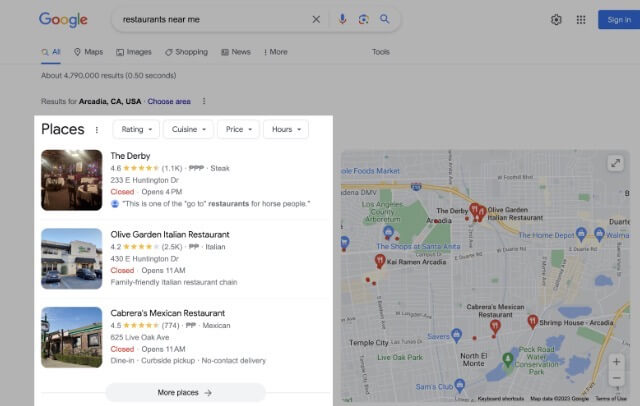
2- Perform Keyword Research to Find the Most Used Local Keywords
Use Keywords Everywhere to perform keyword research to identify the keywords used locally to search for your industry and make sure you incorporate them in your Google profile and other local listings.
3- Focus on Reviews
Reviews are a very powerful factor in your local listing to rank higher in SERPs.
Make sure you generate as many reviews as possible after performing services to your clients.
Don’t forget to address and respond to reviews both the positive and negative ones.
Work on Technical SEO
Technical SEO focuses on enhancing a website’s technical components to boost its search engine ranking by making its content easy to crawl and index by search engines.
1- Audit Your Website for Technical Issues
Audit your website to ensure it doesn’t have any broken links, broken images, duplicate titles, slow-loading pages, or any other technical issues.
SEO Minion offers you a timely solution for efficiently identifying and resolving broken links in bulk.
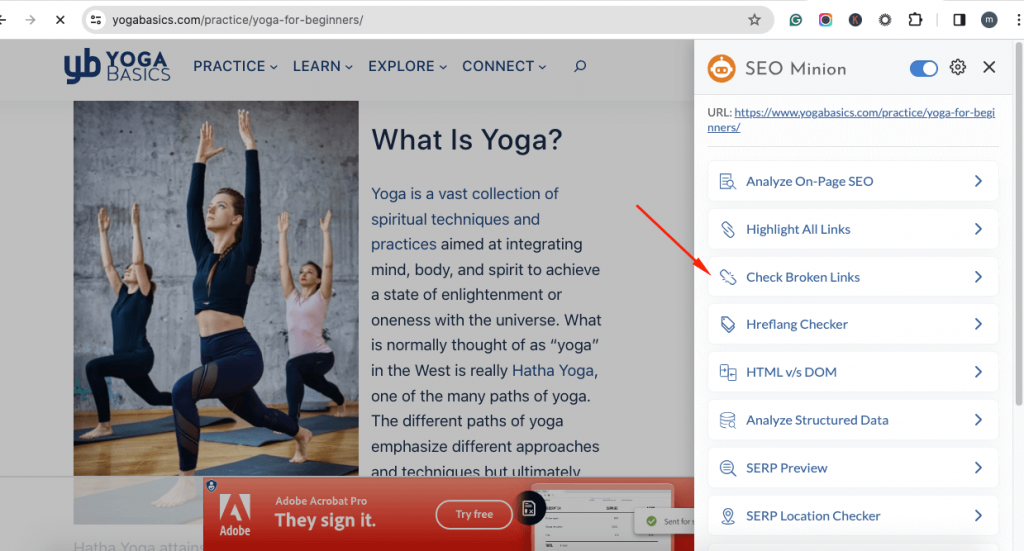
2- Improve your Website Speed
Test your website speed regularly and work on enhancing it by optimizing images, enabling browser caching and fixing any server performance issues.
3- Make it Mobile-Friendly
Ensure your website is responsive and mobile-friendly to provide a seamless experience for users accessing your site on mobile devices.
4- Optimized Site Structure
Create a clear and logical site structure with organized navigation and URL hierarchy to help search engines crawl and index your site efficiently.
Analyze and Refine Performance
The last step to increase your website’s organic traffic is to analyze your current performance and study where you are at and which areas you can improve. You can do this through Google Analytics and Google Console.
Use the Keywords Everywhere extension to add more detailed metrics to Google Analytics and Google Console such as the exact monthly search volume, CPC, completion, and trending data.
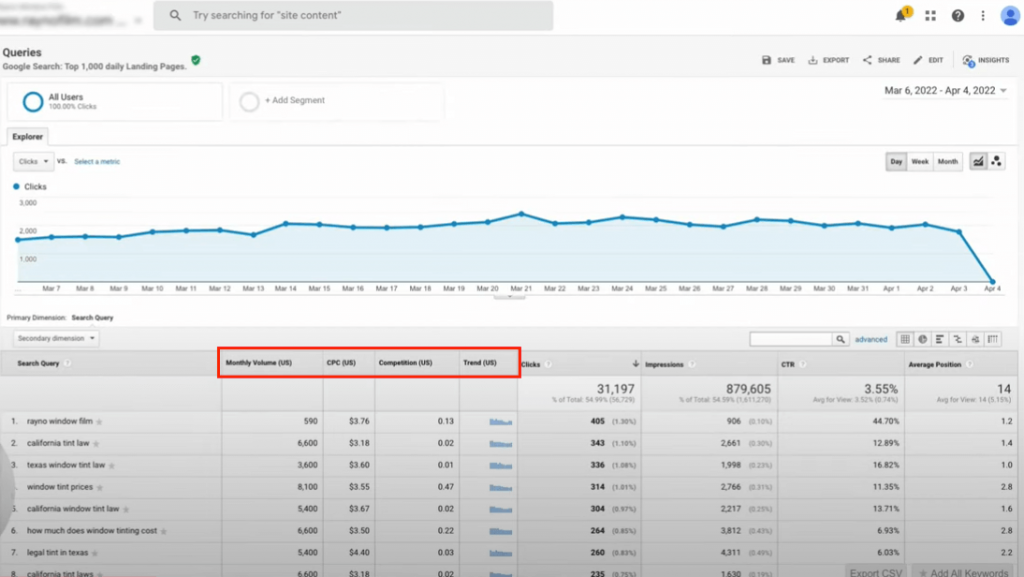
Discover your top-ranking pages and work on enhancing all the discussed strategies to further optimize them.
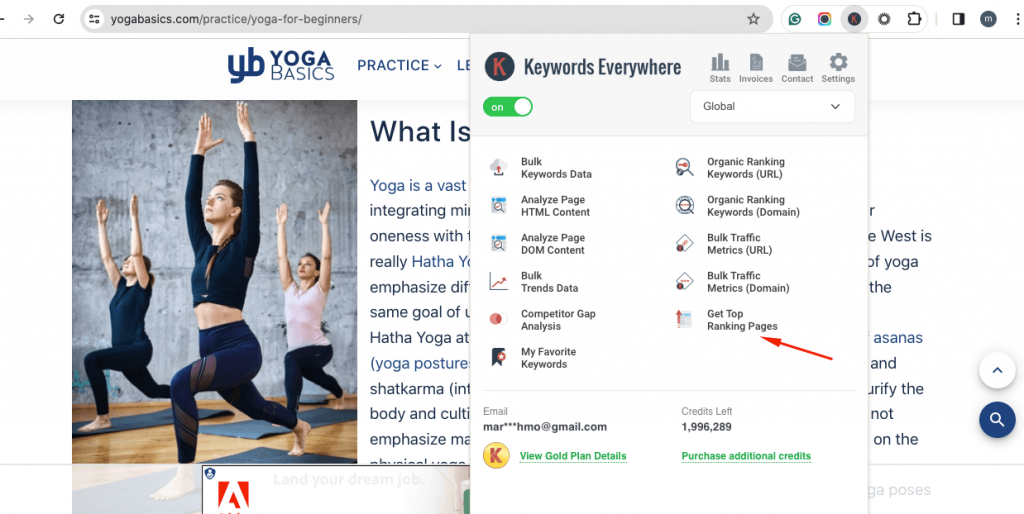
Conclusion
Organic traffic is a cost-effective way to drive valuable and qualified leads to your website. It is a scalable and lasting method to drive visits.
You can improve organic traffic by identifying the right keywords to target, creating valuable content, working on and off-page optimization, enhancing technical SEO, and creating a local listing for your business.


